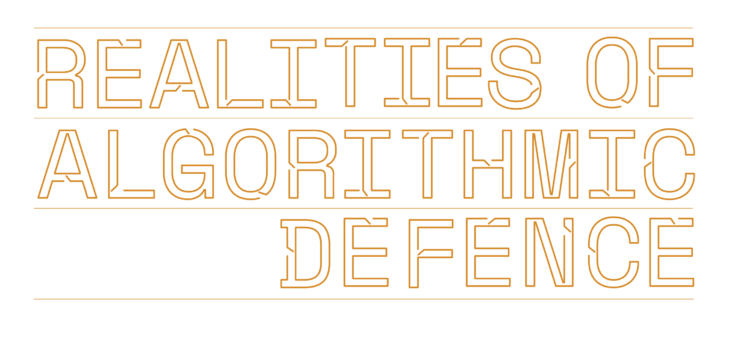On 8 June 2022, IRW’s Prototype Warfare project organises the Realities of Algorithmic Defence symposium in collaboration with the Advisory Council on International Affairs (AIV) to discuss the current state of the development of operational autonomy in military technology systems with experts and practitioners. The symposium will take place from 14:00-17:00 CET in the Belle van Zuylenzaal at the Academiegebouw in Utrecht. The event is centered around the 2021 advisory report ‘Autonomous Weapon Systems: The Importance of Regulation and Investment‘, which was created for the Dutch Ministry of Defence by the AIV and the Advisory Committee on Public International Law (CAVV).
As AI is increasingly integrated into all aspects of human life, advanced militaries worldwide have found themselves in what some call an AI arms race, feeding into the third revolution in warfare. In this context, advanced militaries such as those of the US, Russia, China, and the Netherlands have been experimenting with and deploying technologies with various levels of autonomy across numerous battlefields in Libya, Syria, Mali, and Ukraine. While developers and armed forces promise more effective military engagement through increased speed and precision, academic and policy debates tend to focus on the threat of fully autonomous weapons making life-and-death decisions. These debates are fed by the expanding number of weapon systems capable of autonomously identifying targets through machine learning algorithms, including the KUB-BLA, the Switchblade 300 and 600, the Phoenix Ghost, and the Harpy loitering munitions.
But to have an informed debate amongst all stakeholders involved in developing, analysing, and regulating autonomous weapon systems, it is crucial to reflect on questions such as: What is the definition of autonomy? By whom and how are these weapon systems being developed? What problems are these technologies seen to be a solution for? How autonomous are they in reality? How and where are they being experimented with and deployed? And to what effect? How is this changing the nature of warfare? What are the legal, political, and ethical concerns surrounding lethal autonomous weapons? How and why should they be regulated?
Taking the AIV and CAVV’s report on the development and regulation of autonomous defence systems as our starting point, the aim of the Realities of Algorithmic Defence symposium is to provide answers to these pressing questions and stimulate debate amongst the key actors involved in developing, analysing, and regulating autonomous warfare in the Netherlands and beyond.
The first panel, ‘Realities of Developing Autonomous Weapon Systems’, will feature speakers involved in developing, experimenting with, and deploying robotic military technologies. Speakers include:
- Lieutenant-Colonel Martijn Hädicke, commander of the 13th Light Brigade’s Robotics and Autonomous Systems (RAS) unit of the Royal Netherlands Army.
- Maurits Korthals Altes, founder of robotics startup and MoD contractor Avalor AI.
- Dr. Nanda van der Stap, senior scientist innovator and team lead at TNO.
- This session will be moderated by dr. Tim Sweijs, who is the Director of Research at The Hague Centre for Strategic Studies.
During the second panel, ‘Investigating Autonomous Warfare’, we talk to scholars about how they research the development, deployment, and impact of autonomous weapon systems and what their findings tell us about the changing nature of warfare in the 21st century. Speakers include:
- Maaike Verbruggen, Doctoral Researcher at the Vrije Universiteit Brussel and previously active in disarmament policy for the UN, Stockholm International Peace Research Institute, and the Ministry of Foreign Affairs of the Netherlands.
- Dr. Marijn Hoijtink, Assistant Professor in International Relations and International Security at the Vrije University of Amsterdam.
- Jennifer Gibson, US lawyer and lead of NGO Reprieve’s extrajudicial executions team. In this context, Gibson’s focus is on drones and kill lists.
- This session will be moderated by Dr. Lauren Gould, Assistant Professor in Conflict Studies and project leader of the Intimacies of Remote Warfare program, Utrecht University.
The last panel, ‘Challenges of Regulation’, will explore the political, legal, and ethical dimensions of regulating autonomy in weapon systems. Speakers include:
- Prof. dr. Cedric Ryngaert, who is one of the authors of the AIV and CAVV report and a Professor of Public International Law at Utrecht University.
- Jessica Dorsey, an Assistant Professor of the International and European law department at Utrecht University and a research fellow at the International Center for Counter-Terrorism.
- Frank Slijper, who investigates the proliferation of autonomous weapons and the international arms trade at NGO PAX. Pax takes a leading role in the Stop Killer Robot Campaign.
- This session will be moderated by dr. Marijn Hoijtink, Assistant Professor in International Relations and International Security at the Vrije University of Amsterdam.
We invite academics, practitioners, journalists, and students to pose questions and to join in on the debate during the panels. Interested in joining the discussion? Register to join in person here. The event can also be followed through a live stream, which can be accessed here. It will not be possible to participate in the discussion from the online environment.
For those wanting to read up on the topic before the event, we recommend the following sources:
- The 2021 report on autonomous weapons by the AIV & CAVV that is central to the symposium.
- The ‘Lethal Autonomous Weapons: 10 Things We Want to Know’ Podcast with speaker Maaike Verbruggen.
- The article ‘Death by Data’ by speaker Jennifer Gibson.
- The 2021 report ‘Meaning-less Human Control’ by Drone Wars UK on failure in existing air defence systems.
- The article ‘“Prototype warfare”: Innovation, optimisation, and the experimental way of warfare’ by moderator and speaker Dr. Marijn Hoijtink.
- The report ‘Increasing Autonomy in Weapon Systems: 10 Examples’ by NGO PAX.
- The documentary ‘Robotisation in the Dutch Army’ by HCSS with speaker Lt. Col Martijn Hädicke.
The symposium program, including four in-depth profiles of technologies currently owned or being developed by the Dutch armed forces, can be found here:
The Realities of Algorithmic Defence symposium is co-organized by dr. Lauren Gould (project leader at IRW) and a Community Engaged Learning (CEL) group of Conflict Studies and Human Rights students Amé den Hollander, Joel Shepard, Daan Boelens, and Linde Arentze, coordinated by Jack Davies. The symposium and CEL are a product of the Prototype Warfare project, a collaboration between dr. Lauren Gould’s Intimacies of Remote Warfare program (UGlobe and IOS’s Contesting Governance platform, Utrecht University) and dr. Marijn Hoijtink’s Deadly Design project (Vrije Universiteit Amsterdam).




